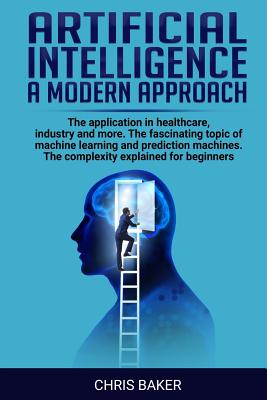The Simulation Hypothesis: An MIT Computer Scientist Shows Why AI, Quantum Physics and Eastern Mystics All Agree We Are In a Video Game
暫譯: 模擬假說:麻省理工學院計算機科學家揭示為何人工智慧、量子物理學與東方神秘主義者皆同意我們身處於一個視頻遊戲中
Virk, Rizwan
- 出版商: Bayview Labs, LLC
- 出版日期: 2019-04-01
- 售價: $770
- 貴賓價: 9.5 折 $732
- 語言: 英文
- 頁數: 332
- 裝訂: Quality Paper - also called trade paper
- ISBN: 0983056900
- ISBN-13: 9780983056904
-
相關分類:
物理學 Physics、量子 Quantum
無法訂購
商品描述
The Simulation Hypothesis, by best-selling author, renowned MIT computer scientist and Silicon Valley video game designer Rizwan Virk, is the first serious book to explain one of the most daring and consequential theories of our time. Riz is the Executive Director of Play Labs @ MIT, a video game startup incubator at the MIT Game Lab.
Drawing from research and concepts from computer science, artificial intelligence, video games, quantum physics, and referencing both speculative fiction and ancient eastern spiritual texts, Virk shows how all of these traditions come together to point to the idea that we may be inside a simulated reality like the Matrix.
The Simulation Hypothesis is the idea that our physical reality, far from being a solid physical universe, is part of an increasingly sophisticated video game-like simulation, where we all have multiple lives, consisting of pixels with its own internal clock run by some giant Artificial Intelligence. Simulation theory explains some of the biggest mysteries of quantum and relativistic physics, such as quantum indeterminacy, parallel universes, and the integral nature of the speed of light.
Recently, the idea that we may be living in a giant video game has received a lot of attention:
"The chances that we not in a simualtion is one in billions." -Elon Musk
"I find it hard to argue we are not in a simulation." -Neil deGrasse Tyson
"We are living in computer generated reality." -Philip K. Dick
Video game technology has developed from basic arcade and text adventures to MMORPGs. Video game designer Riz Virk shows how these games may continue to evolve in the future, including virtual reality, augmented reality, Artificial Intelligence, and quantum computing. This book shows how this evolution could lead us to the point of being able to develop all encompassing virtual worlds like the Oasis in Ready Player One, or the simulated reality in the Matrix.
While the idea sounds like science fiction, many scientists, engineers, and professors have given the Simulation Hypothesis serious consideration. Futurist Ray Kurzweil has popularized the idea of downloading our consciousness into a silicon based device, which would mean we are just digital information after all. Some, like Oxford lecturer Nick Bostrom, goes further and thinks we may in fact be artificially intelligent consciousness inside such a simulation already
But the Simulation Hypothesis is not just a modern idea. Philosophers like Plato have been telling us that we live in a "cave" and can only see shadows of the real world. Mystics of all traditions have long contended that we are living in some kind of "illusion "and that there are other realities which we can access with our minds. While even Judeo-Christian traditions have this idea, Eastern traditions like Buddhism and Hinduism make this idea part of their core tradition -- that we are inside a dream world ("Maya" or illusion, or Vishnu's Dream), and we have "multiple lives" playing different characters when one dies, continuing to gain experience and "level up" after completing certain challenges. Sounds a lot like a video game
Whether you are a computer scientist, a fan of science fiction like the Matrix movies, a video game enthusiast, or a spiritual seeker, The Simulation Hypothesis touches on all these areas, and you will never look at the world the same way again
商品描述(中文翻譯)
《模擬假說》是暢銷書作家、著名麻省理工學院計算機科學家及矽谷電子遊戲設計師Rizwan Virk的第一本嚴肅著作,解釋了當代最大膽且影響深遠的理論之一。Riz是麻省理工學院遊戲實驗室的Play Labs執行董事,這是一個專注於電子遊戲的創業孵化器。
Virk從計算機科學、人工智慧、電子遊戲、量子物理等領域的研究和概念中汲取靈感,並參考了投機性小說和古老的東方靈性文本,展示了這些傳統如何匯聚在一起,指向我們可能身處於類似《駭客任務》的模擬現實的觀點。
模擬假說的核心觀點是,我們的物理現實並非一個堅固的物理宇宙,而是越來越複雜的類似電子遊戲的模擬,其中我們都有多重生命,由某個巨大的人工智慧運行的像素組成,並擁有自己的內部時鐘。模擬理論解釋了一些量子和相對論物理學中最大的謎題,例如量子不確定性、平行宇宙以及光速的整體性質。
最近,關於我們可能生活在一個巨型電子遊戲中的觀點引起了很多關注:
「我們不在模擬中的機率是十億分之一。」 - Elon Musk
「我很難爭辯我們不在模擬中。」 - Neil deGrasse Tyson
「我們生活在計算機生成的現實中。」 - Philip K. Dick
電子遊戲技術已經從基本的街機和文字冒險遊戲發展到MMORPG。電子遊戲設計師Riz Virk展示了這些遊戲未來可能如何繼續演變,包括虛擬現實、擴增實境、人工智慧和量子計算。本書展示了這種演變如何可能導致我們能夠開發出像《玩家一號》中的Oasis或《駭客任務》中的模擬現實那樣的全方位虛擬世界。
雖然這個觀點聽起來像科幻小說,但許多科學家、工程師和教授對模擬假說給予了認真的考慮。未來學家Ray Kurzweil已經普及了將我們的意識下載到基於矽的設備中的想法,這意味著我們畢竟只是數位資訊。有些人,如牛津大學講師Nick Bostrom,則進一步認為我們實際上可能已經是這種模擬中的人工智慧意識。
但模擬假說不僅僅是一個現代的想法。像柏拉圖這樣的哲學家早已告訴我們,我們生活在一個「洞穴」中,只能看到真實世界的影子。各種傳統的神秘主義者長期以來一直主張,我們生活在某種「幻覺」中,並且有其他現實可以通過我們的心靈來接觸。即使是猶太基督教傳統也有這個觀念,而東方傳統如佛教和印度教則將這個觀念納入其核心傳統——我們身處於一個夢境世界(「Maya」或幻覺,或維希努的夢),並且在一個人死後有「多重生命」,扮演不同的角色,繼續獲得經驗並在完成某些挑戰後「升級」。聽起來很像一個電子遊戲。
無論你是計算機科學家、像《駭客任務》電影一樣的科幻迷、電子遊戲愛好者,還是靈性探索者,《模擬假說》都觸及了這些領域,你將再也不會以同樣的方式看待這個世界。






























